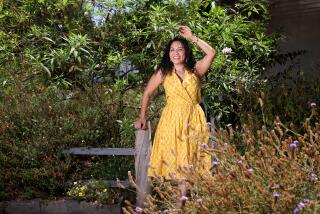Flower Power : VA Hospital’s Lush Garden Helps Veterans Blossom Again
- Share via
There’s a lot more than tomatoes, sweet corn and summer squash sprouting these days at a 15-acre produce patch hidden near the San Diego Freeway in Westwood.
John Steffen’s life is starting to grow and blossom there, too.
The 49-year-old was a homeless, unemployed warehouseman suffering from severe bouts of depression two years ago when he discovered the garden, tucked behind the Veterans Administration Hospital off Wilshire Boulevard.
Few patients ever venture deep enough onto the VA grounds to notice the garden. But doctors have come to view it as the most unusual--and one of the most effective--”treatment rooms” available at the venerable government hospital.
Riotously colored flowers thrive against a backdrop of oak and eucalyptus trees. Trays of gourmet herbs and delicate lettuce plants line a dusty path. Next to a hillside, carefully tended plots of onions, beets, radishes and other produce flourish.
Steffen signed up for his own 15-square-foot plot after entering the hospital’s mental health unit in 1991. Soon, the shy and withdrawn Vietnam veteran was raising his own crops. His self-confidence was growing, too.
On his own, he began writing letters seeking outside support for the garden. One sent to Armstrong’s Home and Garden Center in West Los Angeles led to the donation of 38 trees, 188 plants, 300 pots and a promise of future gifts.
“Sure, I get help with my depression at the mental health clinic,” Steffen said this week as he took a break from hoeing. “But this is better than any medicine they give me,”
Dirt under the fingernails is a tonic for the mind, Ida Cousino agreed. She is a former Michigan farm girl who launched the hospital garden seven years ago after learning that an earlier horticulture center had gone dormant.
“A lot of the guys come out and find out they don’t need sleeping pills after working down here,” said Cousino, 53, of Culver City. “Weeding relaxes and takes the tension out. Watering soothes aggression. Digging is good for motor skills.”
Gardening is good for the wallet, too.
Twenty patients at a time work in the garden. Each shares in part of the profit from flowers and produce they sell to local restaurants and at weekly sales in places such as the farmers’ market in West Hollywood. Some of them earn up to $150 a month.
They raise gourmet-type vegetables such as lollo rosso lettuce for City restaurant on La Brea Avenue and the Border and Fig Tree restaurants in Santa Monica. Freshness is the selling point: Salads are organic and can go from field to plate in less than two hours.
Pesticides are banned because veterans who were exposed to Agent Orange in Vietnam can have allergic reactions to them, Cousino said.
The veterans also take horticulture classes taught by former nursery owner Bob Vatcher of Agoura. The classes help prepare them for jobs with commercial growers and with local parks and recreation agencies.
“If you can’t bend down you get a standing job,” Cousino said. “If you can’t be in the sun because of medication, you get a job in the shade. Everybody works. It’s a great leveler.”
It’s a stabilizer, too.
Vietnam-era veteran Albert J. Turk, 40, a schizophrenic, has worked in the garden for five years. “I like the quiet and relaxed atmosphere,” he said.
Turk is growing tomatoes. A short distance away, another schizophrenic, Lawrence Strauss, is raising squash, corn, cherry tomatoes and sunflowers.
“There’s a positive feeling here. Plants are positive to people who help them. It’s a classless thing,” said Strauss, a 38-year-old West Los Angeles resident involved in a schizophrenia research study at the hospital.
“It’s contact on a simple level with something that makes sense in a shattered society. If the world doesn’t seem to be syncing, this brings a truth to it.”
That’s true, said Dr. Stephen Marder, a UCLA professor of psychiatry who is head of psychiatric services for the hospital.
“Reality-oriented programs can be more effective than intensive psychotherapy,” Marder said.
Dr. Jerry Vaccaro, director of rehabilitation programs for the hospital’s 2,350 psychiatric patients, said garden therapy leads to “fewer relapses, fewer hospitalizations.”
Nearly everyone can benefit from gardening, said Richard Pruett, a 43-year-old Vietnam veteran who is disabled because of post-traumatic stress. He is one of 50 volunteers who help at the garden.
“Everybody has their own row to hoe in this life,” Pruett said.







